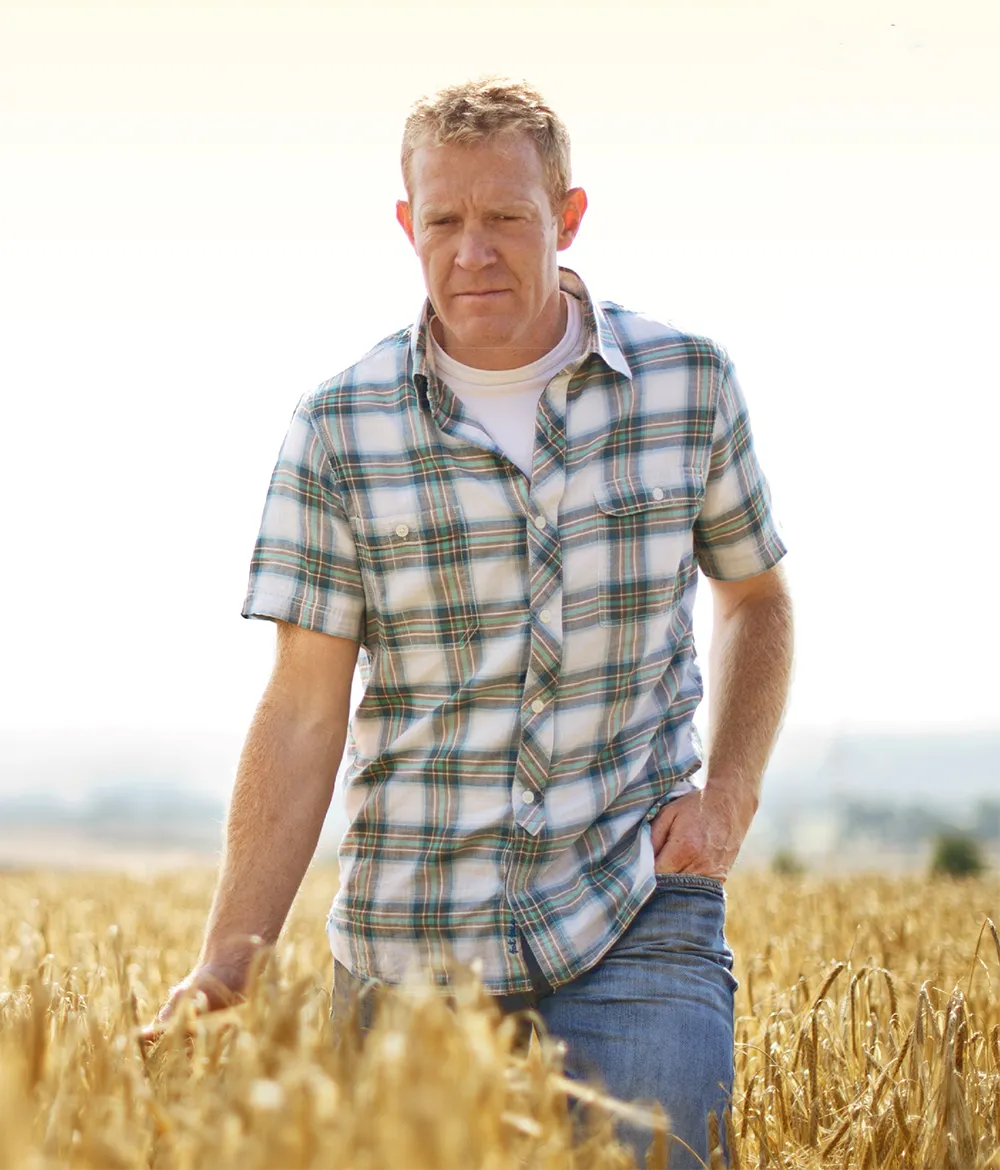“
” -
Those words by the 19th-century poet John Clare reflect an unashamedly romantic view of the British harvest. They conjure up an image of horse-drawn waggons dotted across the fields, children carrying armfuls of freshly cut wheat and the farmer’s wife painstakingly making corn dollies. It’s an enchanting scene but one that is about as far removed from the modern reality as it’s possible to get. Two hundred years after the Northamptonshire Peasant Poet created his rustic harvest vision, the gathering of crops has become a highly technical, totally mechanised and business- focused operation.
On my farm in the Cotswolds and on thousands of others across the country, harvest is the culmination of a year’s work and the most important event in the farming calendar. I’ve got 1,000 acres of wheat, barley and oilseed rape in which I’ll have invested around £250,000 in seed, fertiliser, sprays, labour and harvesting costs. So financially and professionally, there’s an enormous amount riding on a successful harvest. The chocolate-box picture of a whole village at work in the fields with horses and handcarts is a lovely one but it’s totally impractical in the modern age. A top-of-the-range combine harvester can achieve in a few dusty, noisy hours what a small army of Victorian volunteers would have taken days to carry out. I have just a handful of staff using a lot of high-tech, powerful machinery. One person drives the combine, two people drive trailers and one person manages the grain store. In between carting grain, they’ll also move the straw that will nearly all be handled by machine. There’s very little manual labour thanks to elevators, conveyors, telescopic forklifts and bale movers.

Many people are surprised that the harvest season is no longer confined to the traditional months of August and September. We could be lifting early potatoes in the West Country and Pembrokeshire from April and harvesting hardy winter vegetables such as sprouts and cauliflowers through the winter. There’s probably a harvest of one crop or another taking place somewhere in the country every month of the year and recent trends such as polytunnels have helped to delay or speed up growth. I know of a grower for one of the big supermarket chains, supplying new potatoes from Cornwall, who is harvesting them right through until November.
On my farm many of the crop varieties have been bred to mature earlier. For instance, winter barley and oilseed rape are harvested in July, malting barley in the first week of August and by the end of the month we want to have all the wheat in the shed. Winter beans and linseed need more drying out so they will still be being brought in during September.
The right time to harvest is determined by several things: the maturity of the crop, the moisture of the grain and the demands of the market. Our buyers want a certain quality grain with a specific moisture content. The sun is the key to getting the right percentage of moisture in the yield because once it’s in the combine and we cut it, the only way we can dry it is in the grain dryer. As the dryer is fuelled by burning diesel, it is something every farmer wants to avoid if at all possible. In a wet summer, I could be facing drying costs of £30,000 so I need Mother Nature to do her best.

At sowing time we need moist seed beds for rapid germination followed by regular rainfall to nurture the crop. For the past two years, spring has been really dry, which has had an effect on all yields. These conditions make the stalks shorter and mean the plant aborts shoots and ears as it goes into survival mode to produce more seed. It really doesn’t matter whether it rains later in the summer if the damage has already been done in April and May. Add to that the hard winter in Eastern Europe and Russia, and the crop losses that followed, and it’s no surprise that we’re heading for a world wheat shortage. In Northern Europe the wheat harvest might be down by as much as 20 percent on average.
Inevitably that means the price of bread, cakes, biscuits and many other things will go up. Food inflation is here to stay. But of course that doesn’t mean the farmer will be rolling in it. Those higher prices are offset by the lower yields and the increased cost of production, equipment and fuel. Farmers have virtually no influence on the price they are paid for their produce. That’s determined by what is now a global market.
So with all the attention on equipment and economics, has the romance disappeared from harvest? Well it’s certainly no longer a community occasion and I can’t imagine many children wanting to labour in the fields for hours on end in the full heat of the sun. But I’d still like to think that as a nation we haven’t completely severed our links with the past and the true meaning of our agriculture industry. After all, there’s something comforting in the trundling sound of harvest machinery echoing across the land on a late summer’s evening. A feeling that the crop is gathered in and all is well. The end of the season is still marked in our schools and churches even if the original meaning of harvest festival is lost on some.
The West Country is even seeing a revival of the oldtraditionofHarvestHome–afarm-based celebration when the last of the crops are in. A very popular Harvest Home now takes place at Taynton in Gloucestershire and there are several in Somerset that have taken their lead from the one at East Brent. It is thought to be Britain’s oldest, dating back to 1857.
Despite quantum leaps in farming attitudes and technology over the past 50 or 60 years, there are some things that have remained very much the same. At harvest time the need to take advantage of a sunny spell has never changed. A couple of days ago, I was reminded of this by a letter in a national newspaper. It concerned the famous Hampshire farmer Tom Parker who was keen to make the most of a valuable dry day in the middle of an otherwise wet harvest. He was frustrated to discover his workers leisurely tucking into their lunches in the shade. So to hurry them back to the fields, he turned to the nearest munching labourer and in his broad Fareham accent said “Here, would you mind eating your lunch with both sides of your mouth?”.
